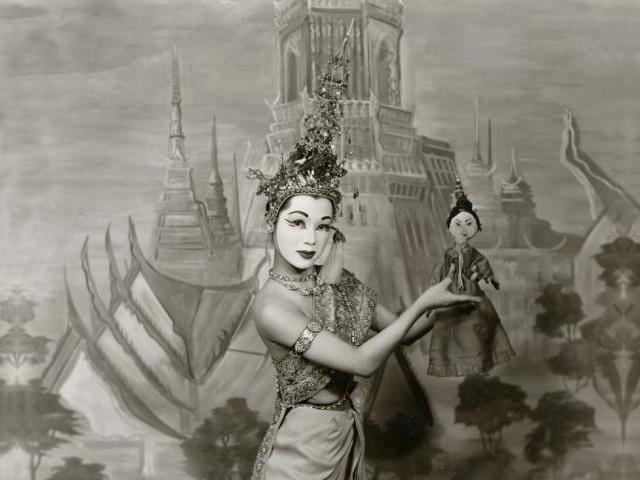Movimiento Cosecha organizers talk about life after DACA, vulnerability, and a border-traversing undocumented Spiderman
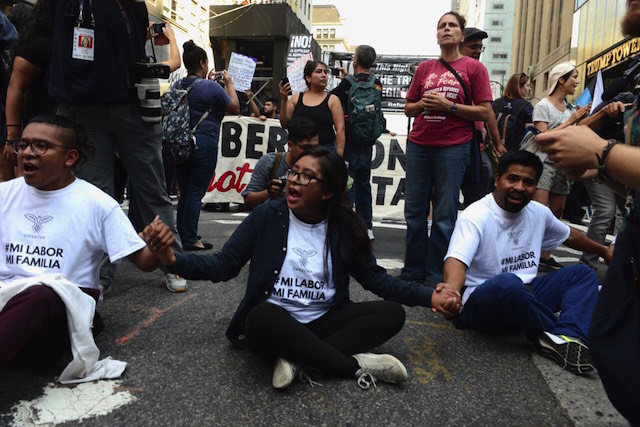
September 28, 2017
Minutes after Attorney General Jeff Sessions announced the repeal of the Deferred Action for Childhood Arrivals (DACA) program on September 5, siblings Catalina and Liborio Adorno (nicknamed “Cat” and “Li”) blocked Fifth Avenue in front of Trump Tower with ten other DACA recipients in an act of civil disobedience. As hundreds of people protested alongside them in the streets of Manhattan, police arrested the undocumented youth—their photos quickly going viral and symbolizing the growing militancy and resistance to administrative attacks on the immigrant community.
Cat and Li Adorno are volunteer organizers with Movimiento Cosecha (which translates to “Harvest Movement”), with Li based in their native New Jersey and Cat in Texas as a full-time activist. Movimiento Cosecha led the September 5 action and is calling for permanent protection for all undocumented immigrants, not just the 800,000 DACA-eligible undocumented immigrants who came to the United States when they were children. After a filling lunch of tamales and tortas, Cat and Li spoke with me in the King Kairos Social Justice House of St. Peter’s University, their alma mater, where their journey as freedom fighters began in 2011. As longtime friends and comrades, we discussed their motivations for getting arrested, the vulnerability of organizing with and for family, and the books that provide levity and guidance in the midst of uncertainty.
—Nina Macapinlac
Nina Macapinlac: Can you talk about the direct action on September 5 and your part in it? How did you decide you were going to participate in civil disobedience, especially as people who have DACA?
Cat Adorno: Well, it’s a mixture of things. There’s the emotional piece and as someone who is an activist I’m also thinking about strategy. In terms of the emotional part, I was fed up with how we are treated in this country.
DACA was not perfect. It was very much a band-aid solution to the immigration crisis. But it doesn’t mean it didn’t do a lot of really good things. Eight hundred thousand DACA recipients were able to get work permits and Social Security numbers. In certain states, they were able to apply for driver’s licenses. It was something that really had a huge effect—not just on the recipients of DACA—but also on their families. A lot of DACA recipients became primary breadwinners for their families because they could now work.
But DACA recipients are no longer the kids that the media paints us out to be. A lot of us are adults. There are a lot of DACA recipients who are parents. Now they also have to provide for their children.
Also, knowing that a DACA repeal would mean that all of these kids who would have been eligible to apply, who are waiting to turn 15 just to apply for this, would no longer be able to do it, that makes me angry. It feels like politicians are always just playing with us. They only pretend to like us when they can gain from it.
Being active in the movement now for a couple of years, right now it feels like we have to change the narrative that the country knows.
In the past decade when we’ve been talking about the DREAM Act and DACA, the conversation has been very focused on 1) the youth and 2) what’s considered the “deserving” immigrant, the “good” immigrant. Only if you’re the valedictorian, only if you have good grades, only if you join the military—there were very clear expectations or qualities that would consider you a “good immigrant.”
If you have something on your criminal record, which is not very hard to get, that’s it. I could get stopped for something really simple like getting having no ID and now I have something on my record! It’s such a crazy system and there is no way for us to win. But that’s the story that the country knows, that’s the story that the country has been hearing: “These are the good immigrants, these are the people that have met this criteria, and these are the people that we are going to support.”
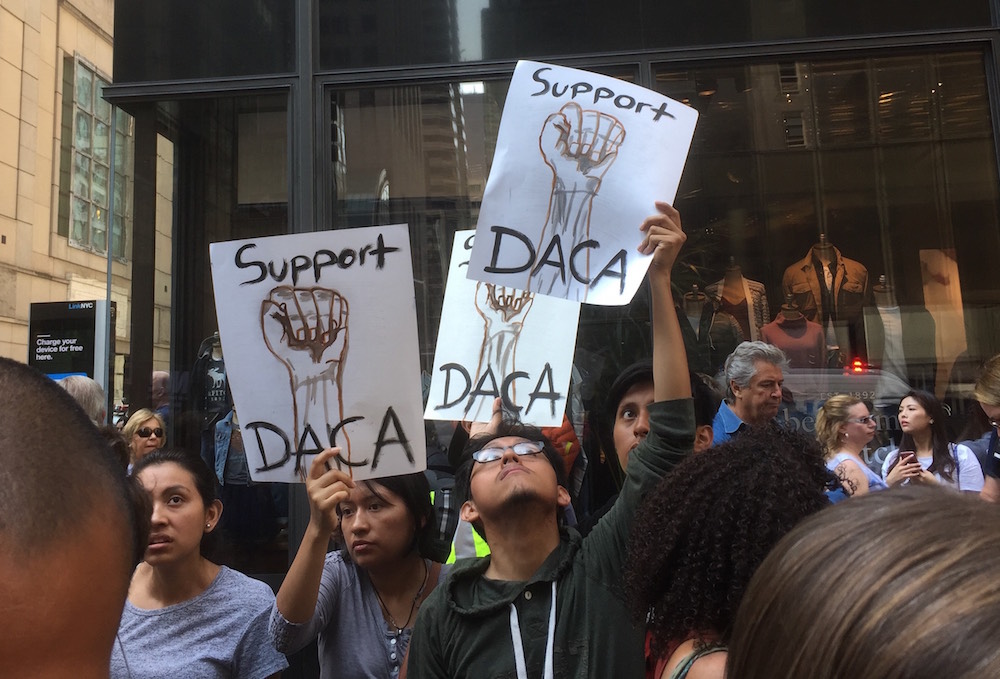
CA: We’re saying that it’s no longer just about the youth and students and the perfect immigrant. Ten years ago no one was coming out and talking about their status publicly at all. Ten years ago, for people to come out and say, “I’m undocumented. Here I am and you have to accept me as I am” was revolutionary to the immigrant rights movement. That played a huge role and we wouldn’t be where we are right now if that hadn’t happened.
DACA was won because people took action. People went out to protests, people held civil disobedience actions. Right now people are shocked that we are doing civil disobedience but we’re like “That’s how we won DACA!” We would never have won it if people had not risked arrest, if they had not come out, if they had not sat on the streets.
So, I think that is important for us to remember—that direct action helped the movement. But now, how do we make things better and how do we change and how do we grow with the movement as well?
With Cosecha, we are saying that we all deserve dignity and respect and so we’re fighting for everyone.
Was there any point, either leading up to the action or even during, when you felt scared?
Li Adorno: These past couple of days I’ve been rushing through different feelings but none of them have been fear. Seconds before I took to the street to block the intersection, I asked myself “Shouldn’t I be hesitant?” But I wasn’t. Being there and seeing my friends from school and from organizing circles and just friends overall—they were in every direction I looked.
It grounded me. I know their stories and understandably they have to balance out being there on the street with me or not. And then it just clicked. I am doing this for me, for my people, for my friends and it just felt so good being there that fear really didn’t and hasn’t kicked in. I’m doing this and I know why I’m doing this and I know how far I’m willing to go for this.

CA: We planned for eleven people to sit down to represent the 11 million undocumented people in the country. We wanted to make clear that the announcement was about DACA and here we have DACA recipients saying, “We want more.” Then at the last minute, some guy walked by who was also a DACA recipient. He saw the action and was like “I’m sitting down, too!”
LA: Yeah, it’s crazy. He was telling his story. He’s actually homeless. It brings in a whole other narrative. People are struggling, you know. And we just lost DACA, this guy just got a new job. It was his fourth day or something, he was saying. And you know, it’s like, shit, what is he gonna do after DACA? So yeah, it sucked. But that inspired me, the fact that he just sat down and got arrested with us.
How did you two start organizing? Did you start at the same time and what did your family think?
LA: It was her fault. I blame Cat! Let’s go to a meeting, she said. It will be fun, she said. We’re gonna make posters, she said. That’s it!
CA: Actually, you know, it all started at St. Peter’s. Some of the first points of contacts for me were the Anakbayan folks. [Anakbayan is a Filipino youth group that fights for the rights and welfare of communities in the Philippines and in diaspora.] Even before I got involved in the immigrant rights movement, I was already friends with the Anakbayan folks.
LA: Definitely. I think I got my initial organizing experiences with Anakbayan and I thought they were really good.
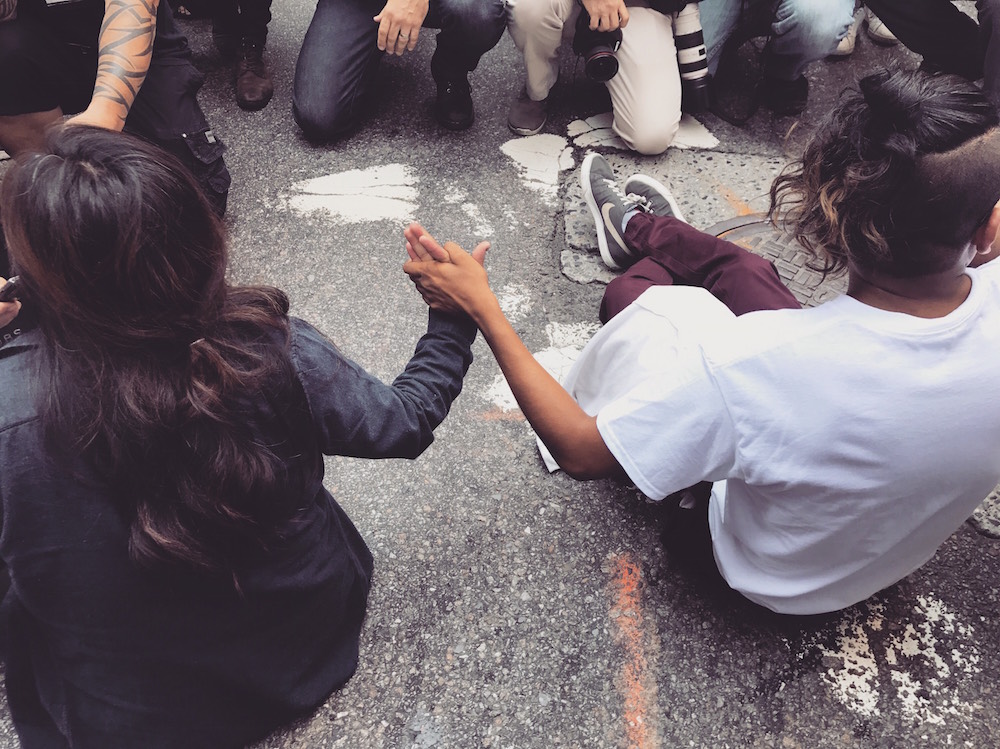
CA: Our mom has always been really supportive. Obviously she worries because she cares and she’s our mom. But at the same time, I don’t remember hearing her ever say, “No, don’t do it.”
Do you ever try to explain to her why you do what you do? Do you ever have those conversations?
CA: Yeah, it’s really funny because I feel like I can have those conversations with other people but not with her. Having the conversation with her just means being more vulnerable because it’s someone who’s a lot closer, and I avoid vulnerability. [Laughs] I can talk to a million people and I can be like, “Yeah, I’m fighting for my mom” but I can’t talk to her about it because it will put us both in a very vulnerable position and I feel like I don’t know how to do that.
No, that’s real. I don’t talk to my parents about it, too. Do you talk to your mom about it?
LA: I had to that time in Texas when Cat got arrested [in a civil disobedience]. I was with Cat doing the livestream and our brother texted me. He’s like, “Yo, when you got the time, you should call mom because she’s not doing well. She just saw that Cat got arrested. You are out there, too.”
I felt like I had to call and try to answer her questions and just be there for her. We talked about why we were taking action and why I was there. Finally I told her that I’m doing this because the day that her mom died I walked into our apartment and I saw her crying by herself.
It hurt me because it just sunk in that she was by herself. She couldn’t go back home to Mexico and she tried to grab onto a wall because there was nobody there for her. You know, nobody from her family. It sucked because I really wanted her to go. It almost felt like we were in the same prison cell. I told her I don’t want people to go through that and it really hurt me when that happened. So it kind of did force me, like Cat said, to be more vulnerable with her.
CA: This is why I avoid it.
LA: I don’t look forward to these conversations, either. But, I felt like I wanted her to feel better. And you know, she told me she didn’t want us to be down there but she also understood why we were fighting and why it was necessary for us to be down there.
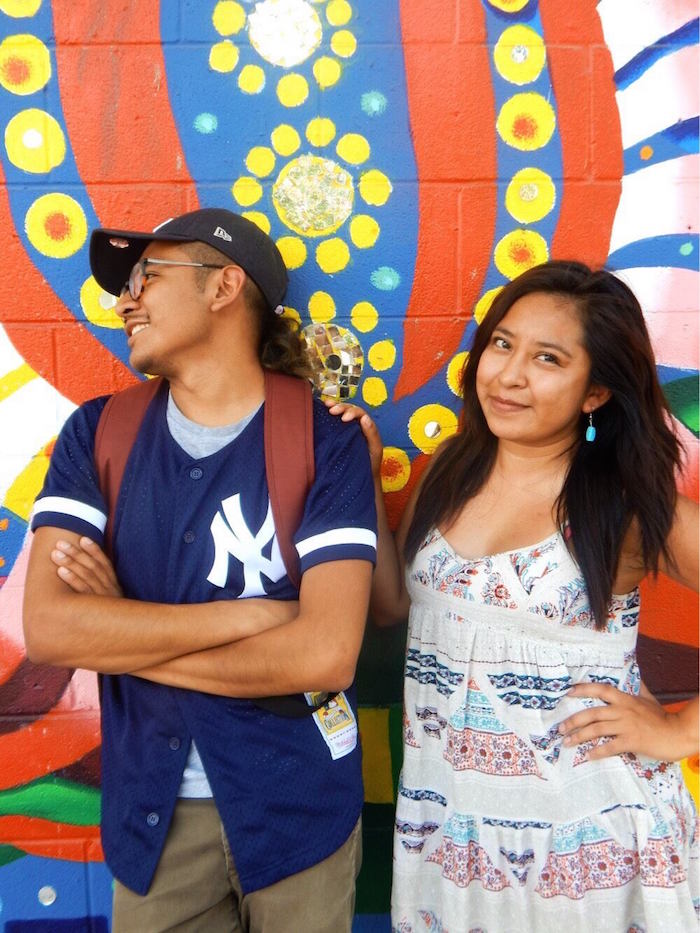
Do you have a book that’s influenced the way you think?
CA: I think it’s been a lot of different books. One was in high school when I read The Autobiography of Malcolm X.
In high school?!
CA: Yeah, I had the coolest history teacher, Mr. Perez. Twelfth grade, AP History. Amazing. He had us reading A People’s History of the United States, The Autobiography of Malcolm X. It was definitely eye-opening.
I had a friend who gave me this one book called No One is Illegal. So good. It’s mostly about the relationship between US and Mexico in terms of policies that have affected migration. That book really helped me understand roots of migration and the outside structures that push people to migrate from their countries. This was at at time when I felt that being undocumented was my fault rather than the fault of a system that makes people undocumented.
How about you, Li? What are you reading? What books do you like?
LA: I was telling you about the Paulo Coelho books. I am reading El Peregrino in Spanish because I gotta practice my Spanish. I like self-exploration or adventure books.
Why do you like those types of books so much?
LA: I feel like these books, are kind of saying, “The world is effed up, but it’s about the people that you meet and the experiences that you have.” Again, like Paulo’s book, I feel like that really does do it justice. I feel like with organizing, I’ve seen a lot, I’ve experienced a lot, I’ve fought against deportations alongside families. Sometimes, you don’t win, and going through those experiences, having friends who come here crossing the border, risking their lives—it’s just a lot that I’ve gone through.
But to think about it, in retrospect, I’ve met so many cool people. And yeah, this is so shitty. My life as an undocumented person, I don’t know where I’m gonna end up, right? But also, there has been a lot of really cool stuff that’s happening. It kind of feels like I’m a character in one of his books, you know? Which is cray.
I saw that Kim K. tweeted something in support of the Dreamers. So where do you think the resistance is heading now?
CA: It’s going live on the Kardashians!
LA: Yo, we gotta get an original series. But seriously, though. My plan if I do get deported—
CA: Get Kim K. to bring you back? [Laughs]
LA: Nah, nah, nah. I want to cross the border again. But this time record it, stream it live. And hopefully get an original series from that. People need to know this shit. And I think Netflix is the platform.
CA: Li is low-key saying this in the recording so that people can read it and sign him up a deal.
LA: You know the reason they keep making Spiderman movies? It’s because they don’t connect with the community, right? So I proposed an idea: you gotta make Spiderman undocumented because it will relate. It’s a guy in Queens. Dude, he’s got to be Hispanic, he has to be undocumented. That would resonate with the people! Like, his parents died crossing the border, you know. He had to go live with his aunt in Queens.
I like that. You were saying that some movements got started by telling stories. Gotta tell the story of undocumented Spiderman!
CA: Undocumented Spiderman! If that’s what it’s gonna take.

